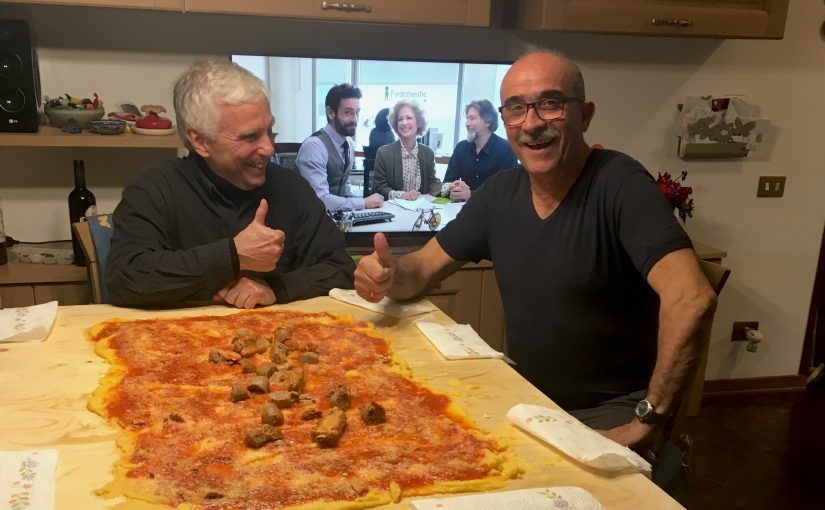Last Friday, I had my neighbors Renzo and Patrizia over for dinner. They were joined by Patrizia’s mother, Puni, and their grown children, Beatrice and Giovanni. I like all of them a lot, and to have them as my second dinner guests in Orvieto was a heartfelt response to that affection, but it was also reciprocation for the several times they’ve so kindly had me over to dine with them. I’m not sure we had all sat down, however, before I was invited to join them, once again, on Monday night. The reciprocation wars have begun, and I am sure to be the loser, because – simply put – I’m not Italian.
When other friends Vera and Giovanni were more active in their little grocery on Via del Duomo, and I brought various friends in to meet them, we could never leave without having been gifted a bottle (or two) of wine. I attempted all manner of payback, including gift items I packed from the States. It was hopeless. For every item I was able to pass to them, two came back at me, and in a manner infinitely more gracious than I could ever drum out of my tally-rendering, American soul.
Something is at work here that I don’t yet fully grasp.
When I arrived last night to Renzo and Patrizia’s little apartment next door, the table was covered with a slightly oversized piece of furniture-grade plywood. Renzo grinned as he watched me eye it, and explained that it was there for the polenta. “Really? No joke?” No, he was serious, and pleased at my astonishment.
I vividly remember a scene from an Italian film I saw many years ago in which the contadini were gathered for lunch during a harvest. The entire, very large, table had been covered with what looked like pizza. There were piles and dots of meat and vegetable scattered around, and everyone took a spoon and dug in. That intrigued me on so many levels. So my excitement was acute; a similar scene was about to unfold in front of me, and what looked like pizza in the film had probably been polenta. Illumination!
Minutes later, Renzo cooked up a large pot and was soon spreading the polenta across the table. Then as Patrizia ladled a sauce onto it, Renzo followed with a finely grated cheese, liberally sprinkled. Finally, sausage and pork rib were placed randomly, more or less in the center. Wine was poured, salutes were made, everyone took a fork, and we dug in.
I asked if there were any rules. Beatrice: “Only one – you have to eat your way to the meat, you can’t just stab it with your fork. You need to earn it.” Puni tunneled an alleyway through her end towards a piece of sausage. “She’s been at this longer than the rest of us. She knows how to bend the rule.” Puni looked up and grinned, everyone laughed.
Renzo: “This is a style of serving that’s only done within the family, but in the old days, it was also common within a very close community. Polenta was a good meal that even the poorest could afford, and one therefore that could be generously shared.” And serving it this way makes it seem that we have more of it than we do. “Yes!” Renzo hit me on the arm as reward for a good observation. “There’s a psychological angle to all of this, too.” Then he told us a story.
“A poor family spread the polenta and sprinkled it with the tiny bit of cheese they had left. Then over the table, they hung a salted fish. Before you ate with your right hand, you whacked the fish with your left. Then you rubbed your hands together and took some polenta. The fish was the flavoring. But if you whacked the fish twice, the father whacked you because that was cheating. You were claiming more than your share.” Everyone laughed and kept eating.
About halfway through our meal the polenta suddenly came to resemble a map of Italy, without the islands. I pointed this out, and Renzo immediately began to devour Trieste. “I have nothing against the city, personally, but you gotta eat what you gotta eat.” He grinned, everyone laughed, and Renzo’s sister, Anna, ate Puglia.
Behind me the television showed Trump giving an interview in an nondescript office. He formed his vowels like a hungry fish, while two journalists – apparently Italian – nodded, and seemed to wonder if it was him, or that their English wasn’t up to the task of making sense of anything he said.
